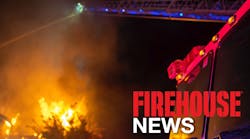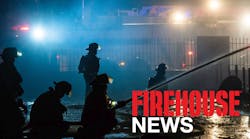Washington--U.S. Rep. Bill Pascrell, Jr. (D-NJ, 8th) today stridently argued in front of the House Committee on Science for the passage of H.R. 1118, the SAFER (Staffing for Adequate Fire and Emergency Resources) Act of 2003. Pascrell is an original cosponsor of the legislation and is the lead Democrat supporting the SAFER act, which is sponsored by House Committee on Science Chairman, Rep. Sherwood Boehlert (R-NY, 24th).
The SAFER Act of 2003 amends the Federal Fire Prevention and Control Act of 1974 to require the establishment of an office within the United States Fire Administration to administer a grant program to make direct four-year grants to State career, volunteer, and combination fire departments for staff increases. The program would allow for a maximum federal contribution of $100,000 per year per firefighter and requires grantees to retain the hired career firefighters for at least one year after grant termination.
"Currently two-thirds of all fire departments throughout America operate with inadequate staffing. This statistic alone is unconscionable. How can any of us, as elected officials, allow this to continue? The consequences of insufficient personnel levels, of course, often lead to tragic, heartbreaking results," stated Pascrell. "It is absolutely critical for Congress to address the staffing needs of our nation's fire departments."
Pascrell has been a leader in meeting the needs of our nation's fire departments since the beginning of his tenure in Congress. He is the author of the FIRE Act, the first ever comprehensive federal commitment to local fire departments. His legislation, signed into law in 2000 by President Clinton, created the Assistance to Firefighters Grant Program. The program has awarded $450 million in grants to career and volunteer departments in the first two years of the program and is set to deliver $750 million in grants in fiscal year 2003.
Rep. Pascrell's full statement given to the House Committee on Science:
The Honorable Bill Pascrell, Jr. Testimony Before House Committee on Science
U.S. House of Representatives June 4, 2003
Mr. Chairman and members of the House Committee on Science, I appreciate the opportunity to testify before you today on behalf of H.R. 1118, the SAFER Act-legislation that can undoubtedly help us meet the urgent needs of fire services throughout our nation.
I would just like to take a moment to commend Senator Dodd and Chairman Boehlert for the exemplary leadership they have displayed on behalf of the fire community over the years, as well as for their tireless efforts in navigating the SAFER Act through the legislative maze that is Capitol Hill.
Indeed, it is absolutely critical for Congress to address the staffing needs of our nation's fire departments. Just look at the facts:
Currently two-thirds of all fire departments throughout America operate with inadequate staffing. This statistic alone is unconscionable. How can any of us, as elected officials, allow this to continue? The consequences of insufficient personnel levels, of course, often lead to tragic, heartbreaking results.
In communities of at least 50,000 people, 38 percent of firefighters are regularly part of a response that is not sufficient to safely initiate an interior attack on a structure fire because of a lack of staffing.
Twenty-one percent of rural departments are often unable to deliver the four firefighters needed to safely initiate an interior attack.
In Buffalo, Washington DC, New York and Worcester Massachusetts-just to name but a few-firefighters have been killed because of a lack of staffing. In each of these cases, if there had been a team in place that accounted for the firefighters who were putting out fires inside of buildings, they would be alive today.
A New Jersey Division of Fire Safety report issued this past March regarding the Passaic Fire Department in my district stated that:
"insufficient staffing seemed to have fostered a culture of individualism in the fire department over a long period of time, and a lack of supervision due to short staffing made it difficult to address this situation."
My friend, Chief Lou Imparato is doing the best he can with the funding he has, but the problems the Passaic Fire Department experiences related to a lack of staffing culminated in the death of firefighter Alberto Tirado, who went to a third floor of a structure by himself in an effort to do his duty, and died because of it. This is happening in my district, it's happening in your district, it's happening throughout the nation.
And things are getting worse. The current economic malaise that we find ourselves in has many local jurisdictions facing tough decisions. Departments all across the country are laying off firefighters-just at a time when we need them most.
The challenges of a changed world have irrevocably altered the role of our firefighters. Along with all the other profound responsibilities of which their profession has been charged, firefighters are now the front-line defenders against terrorism within our borders.
And if we are serious-truly serious-about our national security, and about the safety of our people, then the federal government has an obligation to assist local fire departments in every way we can.
Like many members of this committee, I have long fought for additional funding for America's fire departments. In 1999, I introduced the Firefighter Investment and Response Act, to provide federal grants directly to local fire departments to help address a variety of equipment, training and other firefighter-related needs. It has been my greatest honor to see this bill signed into law.
The original draft of the FIRE Act tried to get more firefighters into uniform-to help fire departments meet their staffing shortages. Unfortunately, it has been difficult to implement the personnel category because the money has to be spent in one year, prohibiting municipalities from long-term personnel additions.
So I am excited that we are all here to return to address this omission. The SAFER Act would create a four year program where fire departments would apply for federal grants that would pay the majority of the costs associated with hiring new firefighters, not to exceed $100,000 over four years for each firefighter hired.
Adequate staffing is essential to safe and effective emergency operations-I know of no one who would attempt to refute this.
The firefighters whose bravery and valor protect our nation deserve all that we can give them, and it is my hope that this Congress truly begins to realize our responsibilities this year.
Again, I would like to thank the Chairman and members of the Committee for this hearing, and I wish to thank all of our nation's firefighters for everything they do. Related:





